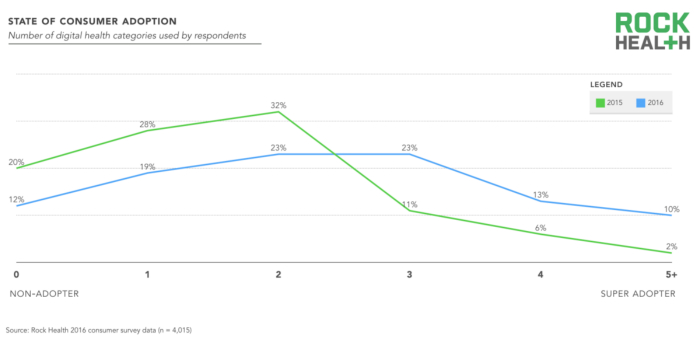There is a very obvious feature in consumers in the health care sector: passive stakeholders. Consumers are faced with a complex medical system with rising prices and higher medical insurance deductibles, and the information is very asymmetric. In the context of the patient-centered care model gradually replacing the medical paternalistic culture, patients become the core of medical care. Just as the Internet has changed the way we learn, communicate, shop and work, it has also changed the way we manage our health. The National Public Radio (NPR) Planet Money program recently stated: “Medical health is an integral part of our economy.†Rock Health has been observing and researching the interactions between consumers and healthcare systems to gain insight into how the industry is being used. Shocked. Since the release of the Digital Healthcare Consumer Orientation Report last year, Rock Health's nationwide survey of more than 4,000 people this year is also full of insight and valuable data. The survey is deployed annually to better understand consumer perceptions and adoptions of digital healthcare, to reveal consumer attitudes toward healthy privacy and trust, and to measure overall consumer behavior. The arterial network (WeChat: vcbeat) has sorted out the main conclusions and opinions. 1. The critical point of consumer health 1. Digital health reached a tipping point in 2016 as consumers have adopted record-setting digital health tools in the past 12 months. Forty-six percent of consumers are now considered active digital health users, using three or more categories of digital health tools (eg telemedicine , wearables), compared to 19% in 2015. Only 12% of Americans are non-adopters, a significant drop from 20% in 2015. Consumer acceptance curve for digital health 2. Consumers’ willingness to pay has tripled compared to 2015, with 39% of consumers strongly agreeing that they are willing to pay for medical expenses. This is similar to the increase in consumers' purchase of high-deductible health insurance plans, from 20% in 2014 to 29% in 2016 (Kaiser Family Foundation data). 3. Even new consumer technologies like virtual reality and augmented reality are also suitable for healthy uses such as relaxation (7%), mental health (4%), rehabilitation (3%) and pain management (3%). 4. Most Americans are interested in getting an electronic copy of their health record, and 20% of Americans have requested or downloaded a copy in the past six months. This broad, consumer-driven digitalization of health data trends and ownership regulations are moving health care out of the traditional analog era. 5. While consumers care about the privacy and security of their health data, the vast majority (77%) are interested in sharing their health information, especially with their doctors. 6. Health data ownership and control are important to consumers, and sharing health care information is considered acceptable only in certain use cases. Nearly 87% of respondents indicated that they have the right to decide who can access their health data, and nearly 86% of respondents said they should tell them which health data they collected. We're professional uterine manipulator manufacturers and suppliers in
China, specialized in providing high quality medical instruments with
reasonable price. We warmly welcome you to buy or wholesale bulk uterine
manipulator for sale here and get quotation from our factory. Uterine Manipulator,Gynecology Uterine Manipulator,Uterine Manipulator Instrument,Laparoscopic Uterine Manipulator Tonglu WANHE Medical Instrument Co., Ltd , https://www.vanhurhealth.com